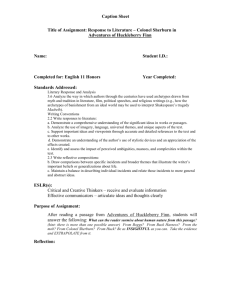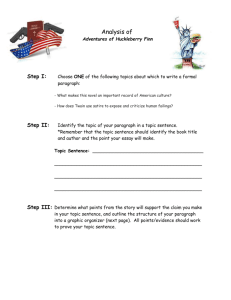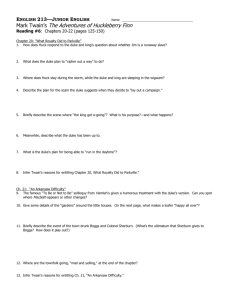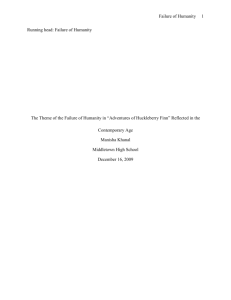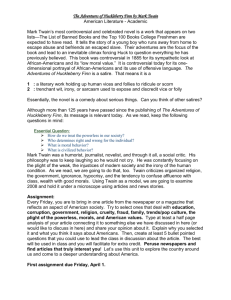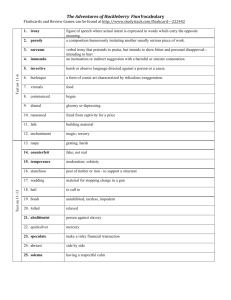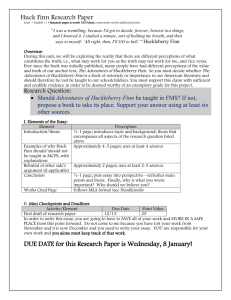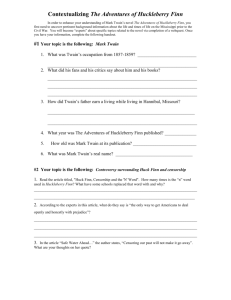The Adventures of Huckleberry Finn Excerpt I
advertisement
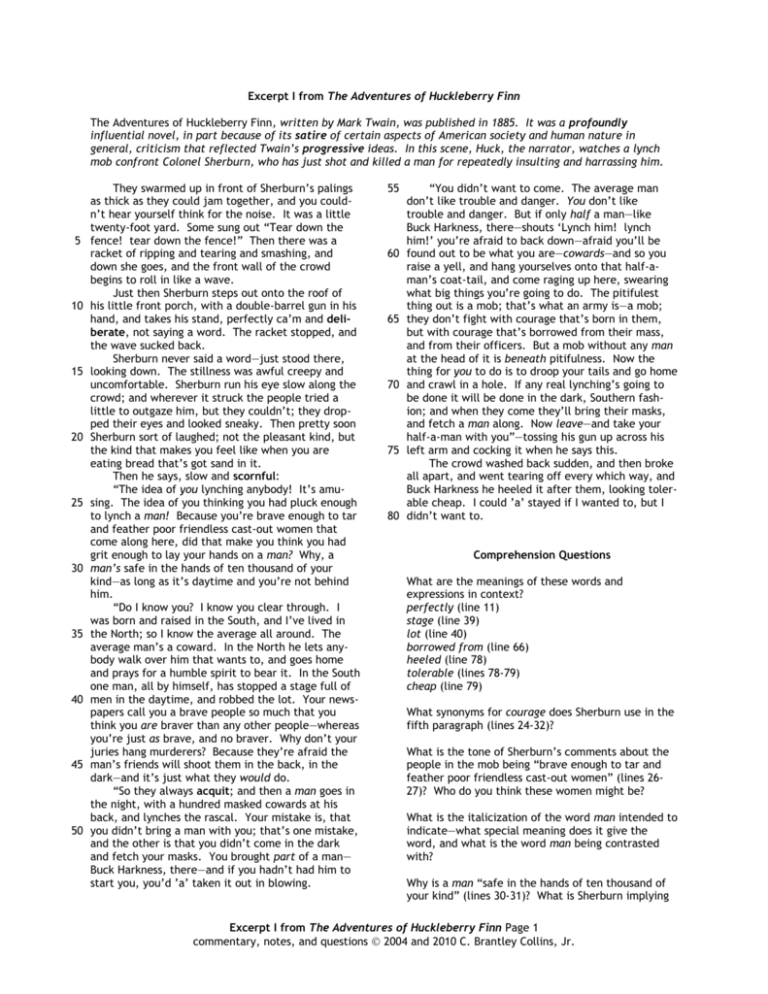
Excerpt I from The Adventures of Huckleberry Finn The Adventures of Huckleberry Finn, written by Mark Twain, was published in 1885. It was a profoundly influential novel, in part because of its satire of certain aspects of American society and human nature in general, criticism that reflected Twain’s progressive ideas. In this scene, Huck, the narrator, watches a lynch mob confront Colonel Sherburn, who has just shot and killed a man for repeatedly insulting and harrassing him. 5 10 15 20 25 30 35 40 45 50 They swarmed up in front of Sherburn‟s palings as thick as they could jam together, and you couldn‟t hear yourself think for the noise. It was a little twenty-foot yard. Some sung out “Tear down the fence! tear down the fence!” Then there was a racket of ripping and tearing and smashing, and down she goes, and the front wall of the crowd begins to roll in like a wave. Just then Sherburn steps out onto the roof of his little front porch, with a double-barrel gun in his hand, and takes his stand, perfectly ca‟m and deliberate, not saying a word. The racket stopped, and the wave sucked back. Sherburn never said a word—just stood there, looking down. The stillness was awful creepy and uncomfortable. Sherburn run his eye slow along the crowd; and wherever it struck the people tried a little to outgaze him, but they couldn‟t; they dropped their eyes and looked sneaky. Then pretty soon Sherburn sort of laughed; not the pleasant kind, but the kind that makes you feel like when you are eating bread that‟s got sand in it. Then he says, slow and scornful: “The idea of you lynching anybody! It‟s amusing. The idea of you thinking you had pluck enough to lynch a man! Because you‟re brave enough to tar and feather poor friendless cast-out women that come along here, did that make you think you had grit enough to lay your hands on a man? Why, a man’s safe in the hands of ten thousand of your kind—as long as it‟s daytime and you‟re not behind him. “Do I know you? I know you clear through. I was born and raised in the South, and I‟ve lived in the North; so I know the average all around. The average man‟s a coward. In the North he lets anybody walk over him that wants to, and goes home and prays for a humble spirit to bear it. In the South one man, all by himself, has stopped a stage full of men in the daytime, and robbed the lot. Your newspapers call you a brave people so much that you think you are braver than any other people—whereas you‟re just as brave, and no braver. Why don‟t your juries hang murderers? Because they‟re afraid the man‟s friends will shoot them in the back, in the dark—and it‟s just what they would do. “So they always acquit; and then a man goes in the night, with a hundred masked cowards at his back, and lynches the rascal. Your mistake is, that you didn‟t bring a man with you; that‟s one mistake, and the other is that you didn‟t come in the dark and fetch your masks. You brought part of a man— Buck Harkness, there—and if you hadn‟t had him to start you, you‟d ‟a‟ taken it out in blowing. 55 60 65 70 75 80 “You didn‟t want to come. The average man don‟t like trouble and danger. You don‟t like trouble and danger. But if only half a man—like Buck Harkness, there—shouts „Lynch him! lynch him!‟ you‟re afraid to back down—afraid you‟ll be found out to be what you are—cowards—and so you raise a yell, and hang yourselves onto that half-aman‟s coat-tail, and come raging up here, swearing what big things you‟re going to do. The pitifulest thing out is a mob; that‟s what an army is—a mob; they don‟t fight with courage that‟s born in them, but with courage that‟s borrowed from their mass, and from their officers. But a mob without any man at the head of it is beneath pitifulness. Now the thing for you to do is to droop your tails and go home and crawl in a hole. If any real lynching‟s going to be done it will be done in the dark, Southern fashion; and when they come they‟ll bring their masks, and fetch a man along. Now leave—and take your half-a-man with you”—tossing his gun up across his left arm and cocking it when he says this. The crowd washed back sudden, and then broke all apart, and went tearing off every which way, and Buck Harkness he heeled it after them, looking tolerable cheap. I could ‟a‟ stayed if I wanted to, but I didn‟t want to. Comprehension Questions What are the meanings of these words and expressions in context? perfectly (line 11) stage (line 39) lot (line 40) borrowed from (line 66) heeled (line 78) tolerable (lines 78-79) cheap (line 79) What synonyms for courage does Sherburn use in the fifth paragraph (lines 24-32)? What is the tone of Sherburn‟s comments about the people in the mob being “brave enough to tar and feather poor friendless cast-out women” (lines 2627)? Who do you think these women might be? What is the italicization of the word man intended to indicate—what special meaning does it give the word, and what is the word man being contrasted with? Why is a man “safe in the hands of ten thousand of your kind” (lines 30-31)? What is Sherburn implying Excerpt I from The Adventures of Huckleberry Finn Page 1 commentary, notes, and questions 2004 and 2010 C. Brantley Collins, Jr. by adding the phrase “as long as it‟s daytime and you‟re not behind him” (lines 31-32)? What is the tone of Sherburn‟s comment about men who “pray for a humble spirit to bear it” (line 38)? What point is Sherburn making when he mentions the stage being robbed? What is the rhetorical effect of Sherburn‟s use of you and your in lines 40-43? What is the tone of Sherburn‟s comment that “you‟re just as brave” (line 43) as any other people? Consider the context in which he says it. What can you infer about how Twain intends the reader to view Sherburn‟s opinions? What aspects of the narrative tell you this? What does Sherburn mean when he says that the mob would have “taken it out in blowing” (line 54)? According to Sherburn, what motivated people to join the mob? How is this fact ironic? What does Sherburn mean when he says that the people‟s courage is “borrowed from their mass” (line 66)? What is the rhetorical effect of Sherburn‟s constant references to Buck Harkness as “half a man”—what is he trying to accomplish by doing this? Why does Huck (the narrator) say “I could ‟a‟ stayed if I wanted to, but I didn‟t want to” (lines 79-80), and how do you think Twain intends the reader to feel about this statement? Questions for Discussion and Writing Discuss how this passage, even though it is a speech by a fictional character, serves as commentary on society and human nature. What does it say about human nature in general and about American society in particular? SAT-Style Essay Prompt Consider the following quotation carefully, then read the prompt below. I know the average all around. The average man’s a coward. —Colonel Sherburn, The Adventures of Huckleberry Finn Assignment: Do you agree with Colonel Sherburn that the average person is a coward, or do people more often demonstrate courage? Decide which of these two positions you agree with, and write an essay in which you use specific examples from your own experiences, your observations, or your studies to support your opinion. AP-Style Essay Prompt In a well-organized essay, analyze the rhetorical devices and strategies, as well as any other methods of persuasion, that Sherburn employs in his speech. What are his goals, and how does he accomplish them? Find examples of the following literary elements and devices in this passage: simile metaphor rhetorical question tense shifts personification irony hyperbole meiosis (understatement) Excerpt I from The Adventures of Huckleberry Finn Page 2 commentary, notes, and questions 2004 and 2010 C. Brantley Collins, Jr.
